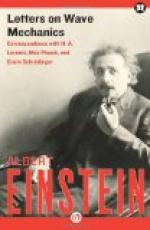|
This section contains 1,570 words (approx. 6 pages at 300 words per page) |

|
Austrian physicist
Erwin Schrödinger shared the 1933 Nobel Prize for physics with English physicist Paul Dirac in recognition of his development of a wave equation describing the behavior of an electron in an atom. His theory was a consequence of French theoretical physicist Louis Victor Broglie's hypothesis that particles of matter might have properties that can be described by using wave functions. Schrödinger's wave equation provided a sound theoretical basis for the existence of electron orbitals (energy levels), which had been postulated on empirical grounds by Danish physicist Niels Bohr in 1913.
Schrödinger was born in Vienna, Austria. His father, Rudolf Schrödinger, enjoyed a wide range of interests, including painting and botany, and owned a successful oil cloth factory. Schrödinger's mother was the daughter of Alexander Bauer, a professor at the Technische Hochschule. For the...
|
This section contains 1,570 words (approx. 6 pages at 300 words per page) |

|


